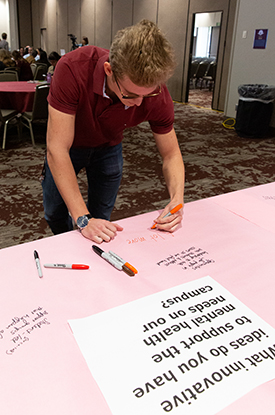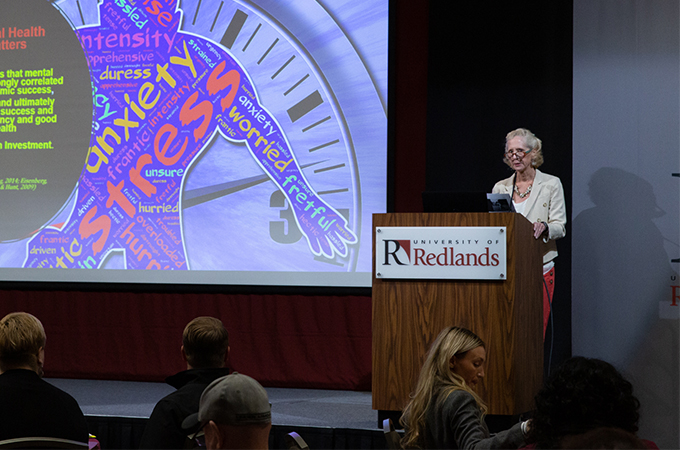“Look around and take note of the people who are here with you,” said Fran Grace, University of Redlands professor of religious studies, to those who had gathered for a meditation session kicking off the inaugural University of Redlands Mental Health and Wellness Summit on February 14. This sentiment—to consider everyone within a community—was reiterated throughout the day’s program.
“The focus of this summit is timely because the rate of mental health needs has steadily climbed in recent years,” said Senior Associate Dean of Student Affairs Ken Grcich, “not only across the nation but often for our students and colleagues.”
In addition to Redlands students, faculty, and staff members, also attending the event were employees and students from California State University, San Bernardino, University of the Philippines, and Redlands Unified School District.
Provost Kathy Ogren welcomed participants, noting, “Today’s panels and sessions offer a rich set of opportunities for education and discussion in which we can engage with one another about student experiences, explore and share resources, and raise our individual and institutional capacity to improve wellness.”

Dori Hutchinson, associate clinical professor and director of services for the Center for Psychiatric Rehabilitation at Boston University, delivered the event’s keynote address. Throughout her talk, she focused on how a campus community can create and cultivate an environment that supports mental health and models wellness.
“Everyone on this campus is a person first,” she said, speaking to the stigma that is often attached to struggles with mental health. “We all have mental health to gain, and we all have mental health to lose.” Students’ secret battles come with them into the classroom, onto athletic fields, and back to their residence halls.
Hutchinson’s view into the lived experiences and struggles of a diverse undergraduate population is shaped by the fact she is embedded in the Boston University campus. She and her husband live in a residence hall with 600 first-year students.
In talking about how other universities are adapting and evolving to support student mental health, Hutchinson suggested moving away from an illness paradigm and toward a wellness paradigm, where services are highly visible and available. Giving incoming students opportunities to connect with others in their communities in order to receive mentorship, advocacy, and care, allows them to talk about their experiences and intersecting identities that influence how they perceive mental health issues and services.
“We all have a role to play on campus in ensuring there is a priority around mental health,” she said. “The key skill required is empathy—it diffuses situations and makes people feel safe. Empathy lets students know that they are seen, heard, and validated.”
Following the keynote, attendees chose from a variety of sessions featuring topics such as mental health in athletics, academic stress and workplace balance, mental wellbeing of first-generation students, and more.
Associate Dean of Community Standards and Wellbeing Jared Rodrigues spoke to supporting and referring students in distress. As the chair of the Campus Assessment, Response, and Education (CARE) Team, Rodrigues offered advice about what to look for and how to respond to a student or community member who is exhibiting concerning behavior.
In addition to referring students to the Counseling Center for mental health services, Rodrigues noted other resources available to the campus community include off-campus services, wellness coaching, the Chaplain’s Office, and the Meditation Room.
“The best thing we can do most of the time for someone in distress,” he said, “is ask questions and give that person the space to talk.”
Learn more about Student Affairs and Community Standards and Wellbeing at the University of Redlands.






